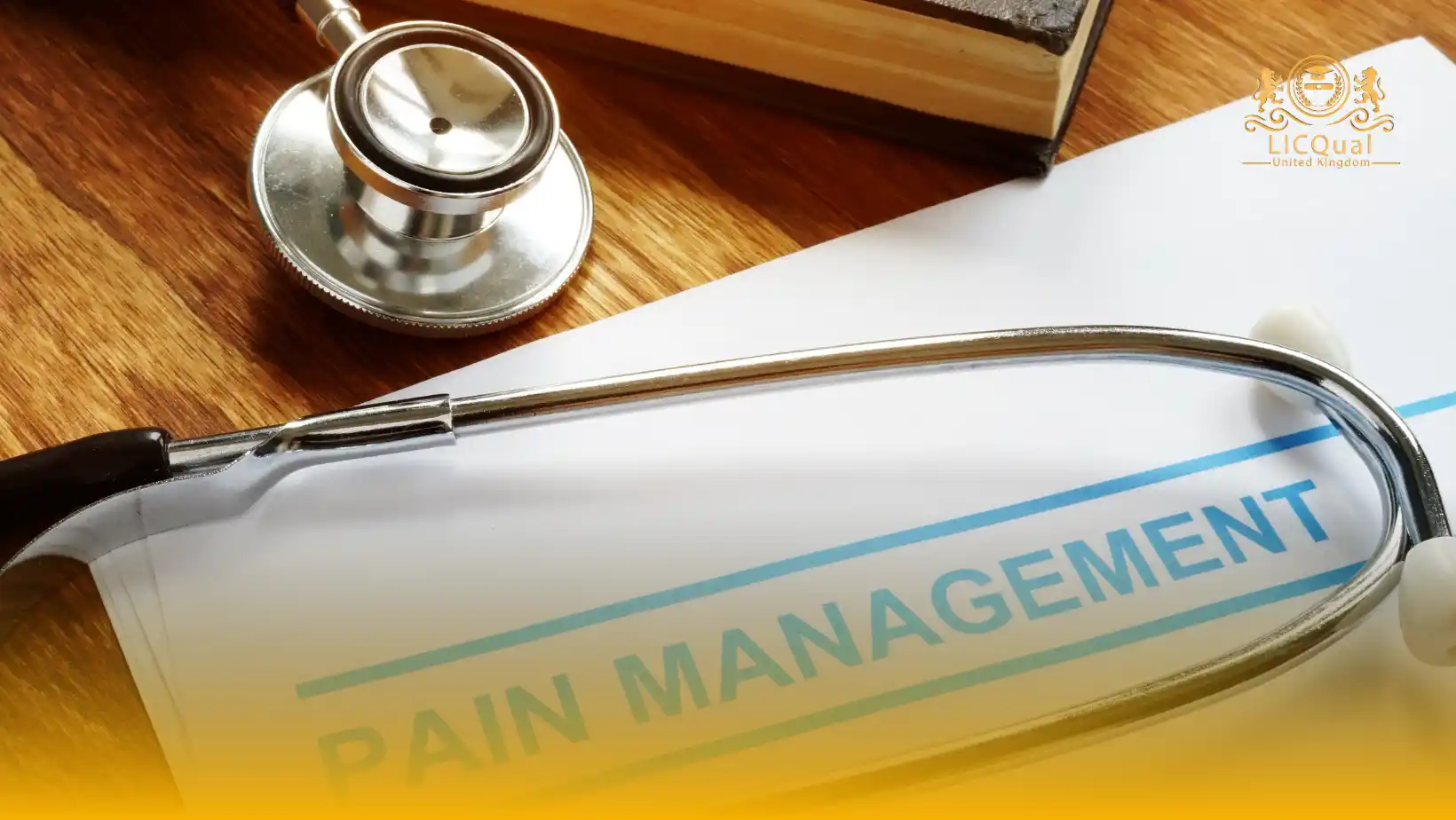The LICQual Level 6 Diploma in Pain Medicine (Dip PM) is an advanced qualification designed for healthcare professionals, clinicians, and medical practitioners who wish to specialise in the assessment, management, and treatment of acute and chronic pain. This diploma is not intended for fresh candidates; it is specifically tailored for experienced professionals seeking to enhance their career prospects, expand their clinical knowledge, and strengthen their Continuing Professional Development (CPD).
Learners undertaking this programme will gain in-depth expertise in the mechanisms of pain, pain assessment techniques, pharmacological and non-pharmacological interventions, interventional procedures, and multidisciplinary approaches to pain management. The course also covers ethical and legal considerations, patient-centred care, and evidence-based practices in pain medicine. Learners will develop the skills required to assess complex pain conditions, design personalised treatment plans, and implement advanced clinical interventions to improve patient outcomes.
Centres delivering the LICQual Level 6 Diploma in Pain Medicine are required to maintain the highest standards of training. This includes employing competent and qualified staff, providing access to modern clinical facilities, simulation tools, and up-to-date learning resources, and ensuring all necessary materials are available to support learner success. Such infrastructure ensures a rigorous, practical, and engaging learning environment, allowing learners to apply theoretical knowledge effectively in real-world clinical settings.
By completing this diploma, learners will enhance their professional credibility, contribute effectively to multidisciplinary pain management teams, and improve patient care. Whether aiming to deepen clinical expertise, engage in research, or assume leadership roles, this qualification equips learners with the advanced knowledge, skills, and professional recognition necessary to excel in pain medicine practice.
Course Overview
Qualification Title
LICQual Level 6 Diploma in Pain Medicine (Dip PM)
Total Units
6
Total Credits
120
GLH
480
Qualification #
LICQ2200952
Qualification Specification
To enroll in the LICQual Level 6 Diploma in Pain Medicine (Dip PM), applicants must meet the following criteria:
|
Qualification# |
Unit Title |
Credits |
GLH |
|---|---|---|---|
|
LICQ2200952-1 |
Fundamentals of Pain Medicine |
20 |
80 |
|
LICQ2200952-2 |
Pain Assessment and Diagnostic Techniques |
20 |
80 |
|
LICQ2200952-3 |
Pharmacological Management of Pain |
20 |
80 |
|
LICQ2200952-4 |
Interventional and Procedural Pain Management |
20 |
80 |
|
LICQ2200952-5 |
Research, Evidence-Based Practice, and Innovation in Pain Medicine |
20 |
80 |
|
LICQ2200952-6 |
Professional Practice and Continuing Development in Pain Medicine |
20 |
80 |
By the end of this course, learners will be able to:
Unit 1: Fundamentals of Pain Medicine
By the end of this unit, learners will be able to:
- Critically evaluate the physiology, pathophysiology, and neurobiology of acute and chronic pain.
- Analyse different types of pain, including nociceptive, neuropathic, and mixed pain syndromes.
- Demonstrate understanding of ethical, legal, and professional responsibilities in pain medicine practice.
- Assess the impact of pain on patient quality of life, functionality, and mental health.
Unit 2: Pain Assessment and Diagnostic Techniques
By the end of this unit, learners will be able to:
- Conduct comprehensive pain assessments using validated scales and clinical tools.
- Interpret diagnostic imaging, laboratory tests, and neurophysiological evaluations to identify pain sources.
- Analyse patient history, comorbidities, and psychosocial factors influencing pain.
- Develop personalised assessment strategies for complex pain conditions.
Unit 3: Pharmacological Management of Pain
By the end of this unit, learners will be able to:
- Critically appraise analgesic therapies, including opioids, non-opioids, adjuvant medications, and multimodal approaches.
- Evaluate indications, contraindications, and potential side effects of pharmacological interventions.
- Apply evidence-based guidelines for safe and effective pain medication administration.
- Monitor and adjust treatment plans based on patient response and evolving clinical needs.
Unit 4: Interventional and Procedural Pain Management
By the end of this unit, learners will be able to:
- Assess the role and application of interventional techniques, including nerve blocks, epidural injections, and neuromodulation.
- Demonstrate procedural skills and safety measures in clinical pain interventions.
- Critically evaluate minimally invasive and advanced techniques in acute and chronic pain management.
- Integrate patient-centred care principles into procedural pain treatments.
Unit 5: Research, Evidence-Based Practice, and Innovation in Pain Medicine
By the end of this unit, learners will be able to:
- Critically analyse current research, clinical guidelines, and emerging trends in pain management.
- Design and evaluate clinical audits, outcome measures, and quality improvement initiatives.
- Apply evidence-based practice to improve decision-making and patient care.
- Utilise research findings to inform innovation, policy, and practice improvements in pain medicine.
Unit 6: Professional Practice and Continuing Development in Pain Medicine
By the end of this unit, learners will be able to:
- Demonstrate professionalism, ethical responsibility, and governance in pain medicine practice.
- Apply leadership and teamwork skills within multidisciplinary pain management teams.
- Engage in Continuing Professional Development (CPD) to maintain clinical competence.
- Implement reflective practice strategies to evaluate performance and enhance patient outcomes.
The LICQual Level 6 Diploma in Pain Medicine (Dip PM) is designed for healthcare professionals who want to advance their knowledge and skills in pain management. This course is ideal for doctors, nurses, anesthetists, physiotherapists, and allied health practitioners seeking specialized expertise in acute and chronic pain care. Whether you aim to work in hospitals, clinics, or specialized pain centers, this Level 6 Pain Medicine Diploma equips you with the practical knowledge and professional recognition to excel in your career.
Doctors and Medical Practitioners
- Physicians specializing in pain management and chronic conditions
- General practitioners managing patients with acute and chronic pain
- Anesthetists providing perioperative pain care
- Clinicians implementing evidence-based pain interventions
- Doctors seeking UK Level 6 recognized certification
- Professionals enhancing clinical decision-making in pain therapy
Nurses and Clinical Staff
- Nurses supporting pain management clinics and hospital units
- Staff assisting in pharmacological and interventional pain therapies
- Healthcare workers monitoring patient responses to treatment
- Professionals providing counseling and patient education
- Staff aiming to enhance practical and clinical skills
- Professionals improving knowledge in pain assessment and care
Physiotherapists and Allied Health Professionals
- Physiotherapists working with patients experiencing chronic pain
- Occupational therapists supporting pain rehabilitation
- Allied health practitioners providing complementary care strategies
- Professionals integrating multidisciplinary approaches in patient care
- Practitioners seeking advanced skills in pain management techniques
- Professionals aiming to improve patient outcomes and quality of life
Students and Graduates
- Medical, nursing, and allied health students pursuing specialization
- Recent graduates aiming for clinical roles in pain management
- Individuals seeking postgraduate diplomas for career growth
- Students combining theoretical knowledge with practical applications
- Learners seeking UK Level 6 recognized certification
- Graduates preparing for professional roles in healthcare settings
Career Advancers
- Professionals aiming for promotions in hospitals or pain clinics
- Practitioners seeking leadership or specialized roles
- Clinicians wanting recognized certification to validate expertise
- Healthcare workers targeting advanced responsibilities in pain management
- Practitioners aiming to enhance employability and career prospects
- Professionals seeking advanced clinical knowledge
Research and Academic Professionals
- Clinicians involved in pain management research
- Academics developing teaching programs in pain medicine
- Researchers exploring chronic pain treatment techniques
- Professionals integrating research into clinical practice
- Staff contributing to scientific publications and pain studies
- Practitioners pursuing academic and clinical growth
To deliver the LICQual Level 6 Diploma in Pain Medicine effectively, centres must maintain high standards of professional expertise, facilities, and learning resources. The following requirements are essential:
- Qualified and Competent Staff: Centres must employ experienced physicians, anaesthetists, pain specialists, and healthcare professionals with recognised qualifications. Staff should be capable of delivering both theoretical knowledge and practical clinical guidance.
- Comprehensive Learning Resources: Centres should provide learners with access to up-to-date textbooks, research publications, clinical guidelines, case studies, and digital learning platforms to support evidence-based practice and advanced learning.
- Clinical and Procedural Facilities: Centres must ensure access to fully equipped clinical environments, pain management clinics, procedure rooms, diagnostic tools, and simulation facilities to enable learners to practice assessments, interventions, and advanced pain management techniques.
- Assessment and Evaluation Systems: Centres must implement robust systems for learner assessment, practical evaluations, feedback, and progression tracking to ensure all learners achieve the required competency standards.
- Health and Safety Compliance: Centres are required to adhere to all relevant health, safety, and regulatory standards, providing a safe and professional learning environment for all learners.
- Support for Continuing Professional Development (CPD): Centres should actively support learners in CPD activities, reflective practice, and ongoing professional development in pain medicine to maintain clinical competence and professional growth.
Meeting these requirements ensures that learners receive a high-quality, professional, and engaging learning experience, equipping them with the knowledge, skills, and confidence to succeed in advanced clinical, research, and leadership roles within pain medicine practice.
Assessment and Verification
All units within this qualification are subject to internal assessment by the approved centre and external verification by LICQual. The qualification follows a criterion-referenced assessment approach, ensuring that learners meet all specified learning outcomes.
To achieve a ‘Pass’ in any unit, learners must provide valid, sufficient, and authentic evidence demonstrating their attainment of all learning outcomes and compliance with the prescribed assessment criteria. The Assessor is responsible for evaluating the evidence and determining whether the learner has successfully met the required standards.
Assessors must maintain a clear and comprehensive audit trail, documenting the basis for their assessment decisions to ensure transparency, consistency, and compliance with quality assurance requirements.







